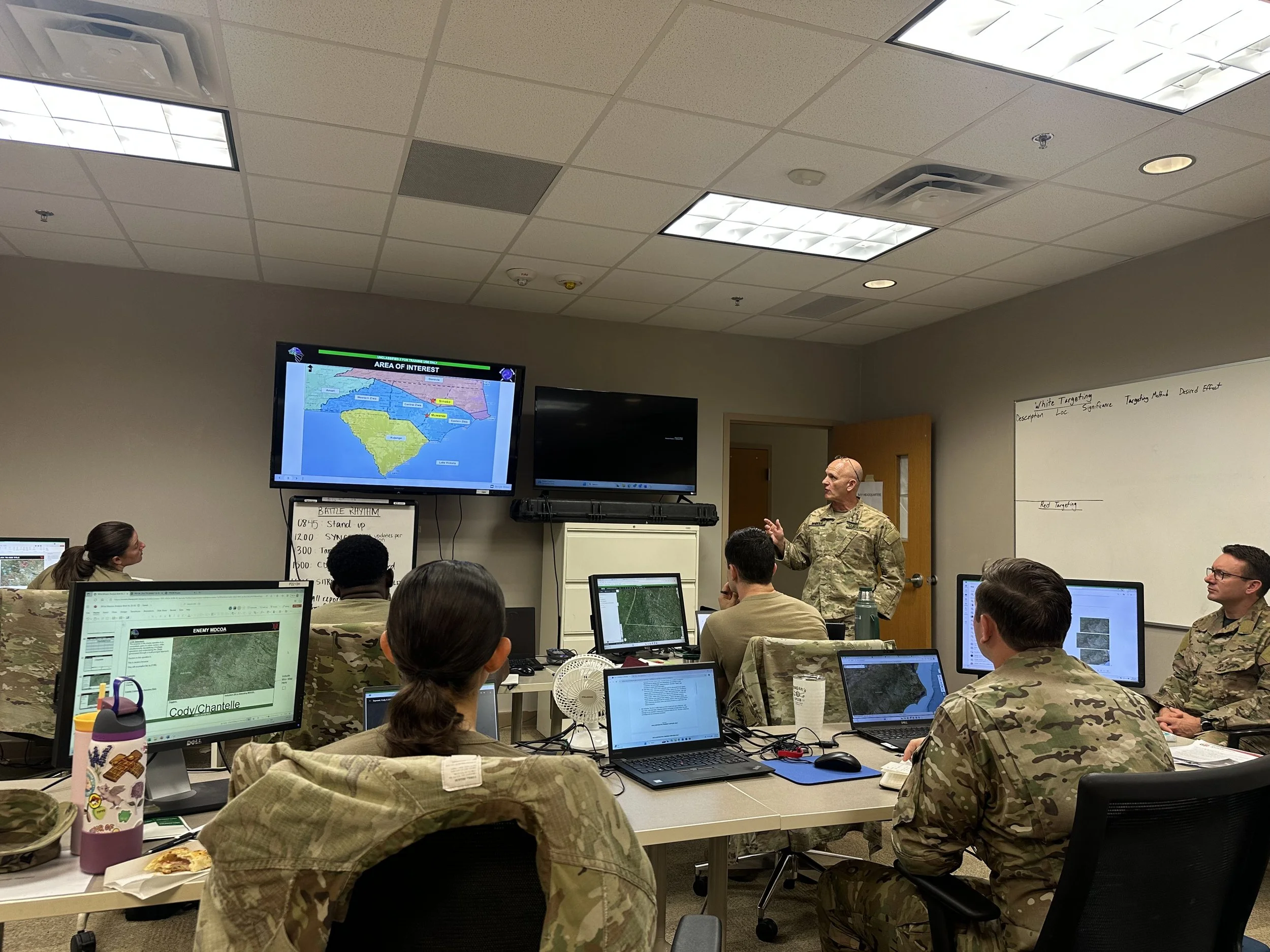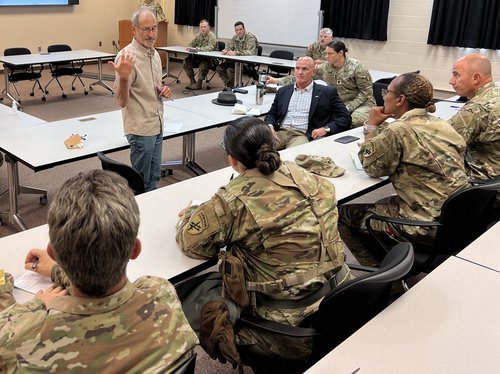Ft. Leavenworth, KS - Soldiers preparing for overseas deployment spend weeks and months ensuring they are ready for anything. Preparations include individual training, unit training, and training for entire Battalions. Each level of training requires soldiers to hone specialized skills so that they are ready to fight and win on any battlefield. For soldiers from United States Army Civil Affairs and Psychological Operations Command (USACAPOC), it’s no different. But in addition to practicing soldier skills from marksmanship to maneuvering, participating in exercises that provide real-world cultural and professional experiences in a training environment are even more crucial to their success.
Motive International excels in that environment by providing subject matter experts with tailored experiences relevant to specific training audiences. In the case of the latest USACAPOC Command Post Exercise, held at the Mission Training Complex in Leavenworth, Kansas, Motive brought five subject matter experts, each with decades of experience, in defense, diplomacy, development, and humanitarian response.
As a social enterprise with a mission to mitigate conflict and enhance stability and sustainability in communities around the globe, Motive International works with governments, private sector organizations, and civil society partners to advance stability through training and education, client programs, and pro-bono impact initiatives. A long-term partner with USACAPOC, Motive supports multiple command post exercises across the country to support training objectives.
“This is my third USACAPOC exercise, and by far, this training audience has been very focused,” explained Marc Boyd, a 32-year Navy veteran and Motive subject matter expert. “I’ve been impressed by the training audience’s early and active engagement with the role players, asking formative and probing questions to determine the best way to respond to the emerging humanitarian and security crisis that is highlighted in the exercise.”
During this exercise that supported multiple units, including 360th Civil Affairs Brigade, 426th Civil Affairs Battalion, 492nd Civil Affairs Battalion, 15th Psychological Operations Battalion, 4th Psychological Operations Group, and the 303rd Army Service Component Command Detachment (Information Operations), Boyd served as a role player as a U.S. Embassy Public Diplomacy Officer, a representative of the United Nations Office of the Coordination of Humanitarian Affairs, and as a local freelance journalist.
Richard Albright provides insight about humanitarian response and international development.
“After 32 years as a Navy Public Affairs Officer working in several U.S. Embassies and operational commands around the world, I joined the United Nations as a program manager for the International Organization for Migration,” Boyd said. “I supported humanitarian programs in West Africa, Libya, Somalia, and Washington, DC. Exercises like this allow me to share my military experience and my experience supporting humanitarian initiatives overseas.”
While this exercise series focused on a fictitious country in a tumultuous region, the scenario is one that could be ripped out of today’s headlines: One nation is overrun by an overzealous neighbor to gain access to the area’s natural resources. A coalition of countries band together to support a United Nations Security Council Resolution to restore the country’s democratically elected government, while restoring security and stability to the region.
Richard Albright used decades of experience in humanitarian response and international development to enhance training. He brings a unique perspective to Motive’s team, having served as Deputy Assistant Secretary in the U.S State Department’s Bureau of Near Eastern Affairs (NEA) coordinating with other State bureaus, USG agencies, and the U.S Congress to ensure the advancement of U.S policy priorities.
As role players, Motive’s subject matter experts help training audiences develop solutions to difficult challenges presented in the scenario. They also learn how they will interact with United Action Partners, such as U.S. interagency partners; United Nations Humanitarian Country Team members; international non-government organizations; and host nation government representatives at all levels, from national to local. Members of the training audience also get a chance to conduct civil engagements with key leaders in the host country.
With subject matter experts serving in several roles, Motive’s role players recalled their experience to ensure the training audience had realistic encounters with Unified Action Partners.
“Motive International has an extremely deep bench of subject matter experts across the spectrum of all military and civilian lines of effort,” explained Pasquale “Pat” Capriglione, a 35-year veteran of the U.S. Department of State where he served as a senior Regional Security Officer and a Provincial Reconstruction Team Commander in al-Anbar, Iraq.
Capriglione is also a veteran of supporting these types of command post exercises, with more than 42 exercises under his belt, and says these missions help prepare units who may serve or interact with U.S. Embassies or interagency partners overseas.
“The training audience has learned the U.S. Ambassador’s role in military conflicts occurring in their area of operation,” Capriglione stated. “The training audience has also learned the roles of each respective Country Team Member and the equities they bring to the fight.”
As a team of role players, Motive’s subject matter experts provide decades of real-world experience and serve as a resource for the training audience as they participate in their command post exercise.
“Motive is uniquely suited to provide this kind of training because no other organization has the mix of backgrounds and depth of experience, both peacetime and conflict, as well as a deep and intuitive understanding of how operations in the field interact with political-level actions in Washington,” said Laird Treiber, a 31-year veteran as an Economic Officer with the U.S. State Department who now focuses on promoting trade and investment and teaches about global economy at George Washington University. “Motive is uniquely placed to translate the strategic imperatives of any successful action into unit-level inputs, and model how those interactions would take place in the real world.”
“Motive doesn’t just provide role players; they provide professionals with decades of specialized experience that is directly related to the task,” Boyd explained. “In the case of this Command Post Exercise for United States Army Civil Affairs and Psychological Operations Command, our five consultants come a variety of backgrounds within the U.S. military, U.S. State Department, and United Nations, that is tailored to the training scenario.
One of those professionals, U.S. Army Col. (ret.) John Maraia, served 28 years as an Infantry officer with the 82nd Airborne and a Special Forces Officer. “I spent the bulk of my career in the 1st Special Forces Group where I commanded from the detachment- to battalion-level, followed by command of Special Operations Command – Forward Lebanon. Staff assignments ranged from U.S. Embassy Jakarta to U.S. Joint Forces Command, U.S. Special Operations Command, the Office of the Secretary of the Army, The Joint Staff, and the Office of the Secretary of Defense,” Maraia said.
John Maraia meets with USACAPOC soldiers in an exercise scenario.
His wealth of experience is well-suited to provide realistic examples to the training audience.
“I think I’ve been able to introduce concepts to the training audience based on my personal experience interacting with Country Teams and host-nation partners,” Maraia explained. “Motive has the proven ability to bring together highly experienced personnel to portray the range of agencies with whom the U.S. military needs to be able to engage and collaborate.”
Learning appropriate ways of engaging and collaborating with various stakeholders in any conflict or humanitarian response is one of the most important take-aways from the exercise, according to Boyd.
“I have a couple of goals in these exercises,” Boyd said. “One goal is to ensure the training audience learns the importance of coordinating activities and synchronizing communication with all relevant stakeholders. This is an important skill to practice during the exercise but is critically important in the real world. When our troops deploy overseas, they will want to ensure that all relevant players are aware of their objectives. These military units, especially those in Civil Affairs, will want to ensure their activities are coordinated with the U.S. Country Team, host nation military commanders, and Unified Action Partners.”
“The second goal I want to convey is to think of the team at the U.S. Embassy as a resource,” Boyd continued. “They can provide invaluable information that is needed to produce a well-informed plan. Soldiers just need to reach out to their State Department colleagues who will, in most cases, be more than willing to share information.”
Maraia agreed, stating exercises like this, “sensitizes the training audience to the need to coordinate with both their U.S. government partners and the host nation.”
Motive’s ability to find subject matter experts eager to share their experiences seems to be paying off.
“From my perspective,” Maraia said, “this training audience is leaning farther forward on engaging the United Action Partners than I’ve seen during previous exercises.”
Treiber agreed. “This is my second exercise, and it's been fascinating to see how different training audiences approached the same scenario. Both exercises have underscored just how important it is for both military units and civilian agencies to understand how the other part of the team thinks and their capacities - as well as what they cannot do or won't do,” said Treiber. “This kind of exercise is a great opportunity to highlight the art of the possible for what can work - and what isn't as productive. It's also been amazing to see how creative some of the training units are in terms of thinking up new approaches and lines of effort.”
Boyd seconded that opinion. “What I’ve learned is that when the training audience uses all the resources available to them, such as role players, they are able to develop better solutions more quickly, allowing unit commanders to make more informed decisions.”
By allowing Soldiers to practice cultural and professional skills learned in a training environment, Motive is helping Soldiers become better prepared to respond appropriately and successfully in any overseas environment.
You can read more about Motive’s robust training and exercise support portfolio on our website. When you are ready to learn more about how Motive subject matter experts can enhance your upcoming training event, please contact us today!







